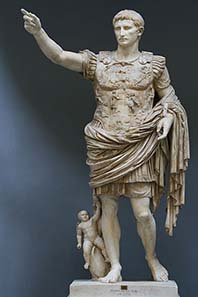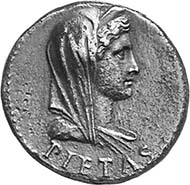by courtesy of Hans Voegtli / ACAMA
At the death of Augustus the Roman polity was not a hereditary monarchy. The power over the Romans was not transferred automatically to his next male relative. On the contrary, complex legal steps had to be taken to guarantee for Tiberius an unproblematic succession to the throne after Augustus’ death.
Statue of Augustus
What did power over the Romans mean in the age of Augustus? The emperor always laid particular emphasis on the fact that he surpassed his fellow-citizens only in authority. But that was not the truth. Augustus had at his disposal two prerogatives that gave him nearly autocratic power. The Imperium Proconsulare made him commander of virtually the whole Roman army. Whereas a regular senatorial proconsul held his office only in one province, Augustus controlled nearly half of them. Legati who were responsible only to him governed them in his name. Nearly all Roman legions were stationed in the emperor’s provinces. Since controlling a province meant also commanding the legion stationed there, Augustus’ military power surpassed that of any other Roman official by far. The reign of Augustus was a well-concealed military dictatorship.
The Imperium Proconsulare ended at Rome’s boundary. For that reason Augustus needed a second prerogative to enforce his policy legally in the Senate. Augustus made the Senators confer on him the Tribunicia Potestas. This privilege gave him the rights the tribuni plebis (= tribunes) had owned in Republican times. Augustus could legally enter any motion in the Senate and he was able to interpose his veto (“I forbid”) upon each decision of any official. The emperor’s power was based essentially on these two prerogatives during the first century BC.
There was one problem: Both prerogatives were not hereditary; the Senate could only bestow them. If Augustus or any other emperor following him wanted to exercise any influence on the election of his successor, he would have to force the Senate during his own lifetime to bestow the Imperium Proconsulare and the Tribunicia Potestas on his potential successor. That was the reason why in Rome – if the succession had been arranged in time – there always existed two emperors. If one of them died, the other one would be able to continue the business as usual. He only had to look for a new successor and co-emperor. Augustus had to do that several times during his tenure. Agrippa – son-in-law of Augustus and father of Caius and Lucius Caesar – had been his co-emperor. He was replaced by Tiberius – stepson and also son-in-law of Augustus.
TIBERIUS, 14-37 AD. As in the name of Drusus, 22-23. PIETAS Diademed, veiled female bust r. Rev. DRVSVS CAESAR TI AVGVSTI F TR POT ITER around SC 15,12 g. BN 48, 74. BMC 133, 98. RIC 97, 43. C. 1.
When Tiberius came to power he had the same problems concerning his succession. He fathered a son, Drusus, and he had adopted his nephew, Germanicus, by order of Augustus. Hence Tiberius had at his disposal two potential co-emperors. But he hesitated to take his choice. He gave both of them the chance to prove their political and military abilities. Not before Germanicus died in 19 AD Tiberius decided to appoint Drusus his successor and co-emperor. He made the Senate bestow the Tribunicia Potestas upon his son in the spring of 23 AD. Our coin was minted on the occasion of this event as we can read on the reverse: DRVSVS CAESAR TIberii AVGVSTI Filii TRibunicia POTestate ITERum, which means Drusus Caesar, son of Tiberius, who was the son of Augustus, holding the Tribunicia Potestate for several years. Drusus himself already had sons. So the future of the empire seemed to be secure for the next two generations. But Tacitus reports that Drusus had a grudger, the praefectus urbis Sejanus.
When we read the masterly written account of Tacitus, we have to be aware that there was a fierce rivalry between Roman senators and knights. Tacitus had seat and vote in the Senate, and he could only disdain a knight like Sejanus. That is the reason why Tacitus alleges that Sejanus reached his position only by tricks and treason. He states that Sejanus seduced Livilla, wife of Drusus, only to reach his ambitious goals. In reality Drusus seems to have been a playboy leaving his wife alone too often. Tacitus interprets the divorce of Sejanus as attempt to convince Livilla of his love, and he informs us about a scuffle between cuckolded husband and lover in public. On September 14 in 23 AD Drusus suddenly died. No wonder that there existed a rumor – well delivered by Tacitus – that Sejanus had convinced Livilla to poison her own husband.
Tiberius didn’t believe that rumour. He chose Sejanus to be the next emperor and he made the Senate bestow some of the imperial prerogatives on Sejanus. In 31 Tiberius changed his policy and let fall Sejanus. The honorable Senators got their revenge: They slaughtered the parvenu from the knightly rank and wiped out his whole family. When Tiberius died 6 years later, there existed no successor who had collected experience as co-emperor. Therefore the Senate decided to bestow the imperial prerogatives on young Caligula, the nephew and next male relative of Tiberius. He failed completely.
Literature:
J. Bleicken, Augustus. Berlin 1998.
E. Meise, Der Sesterz des Drusus mit den Zwillingen und die Nachfolgepläne des Tiberius, JNG 16 (1966), 7-22.
Z. Yavetz, Tiberius. Der traurige Kaiser. München 1999.






